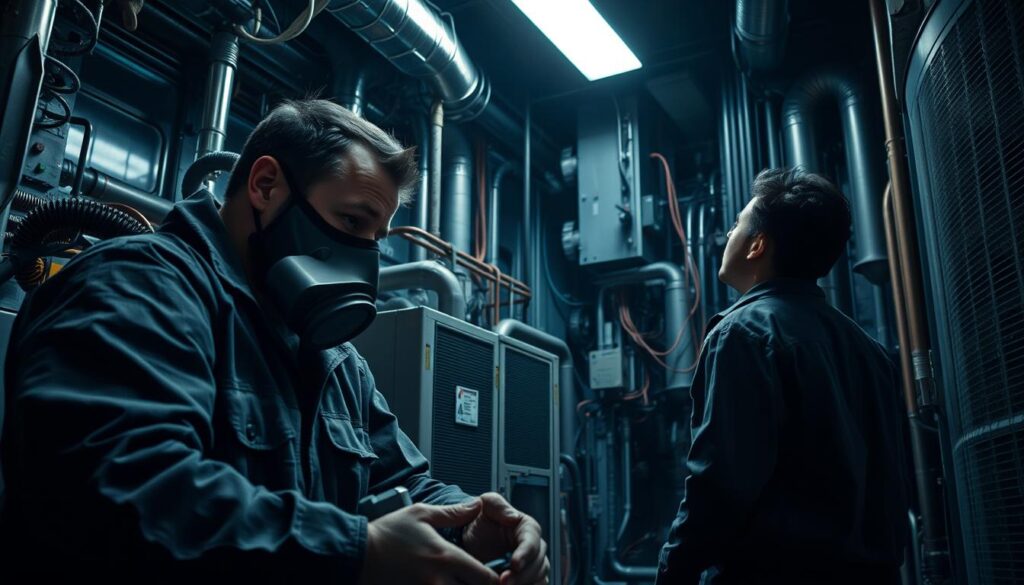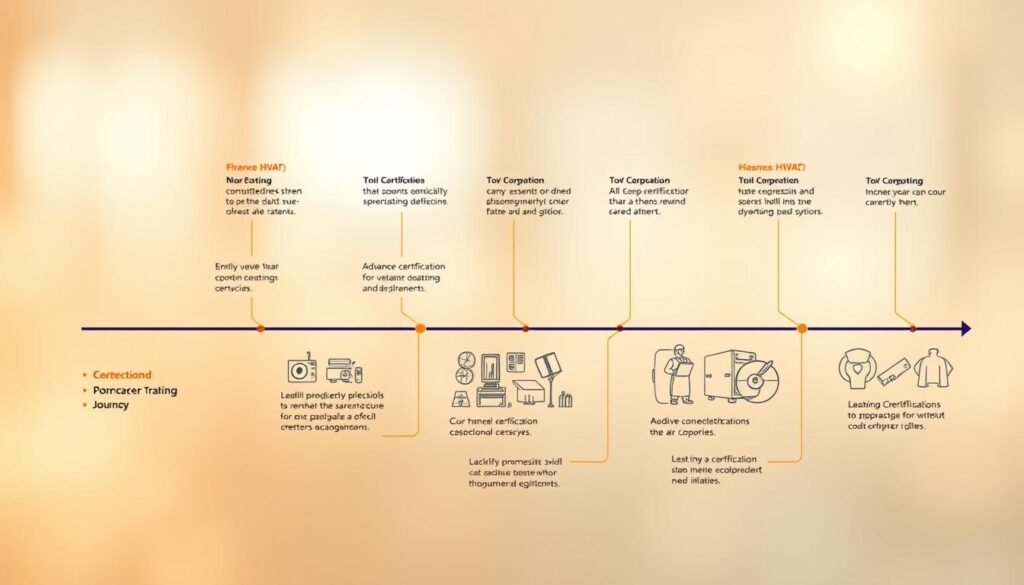Affiliate Disclosure
HVAC Guide Guys is a participant in the Amazon Services LLC Associates Program, an affiliate advertising program designed to provide a means for sites to earn advertising fees by advertising and linking to Amazon.
How Hard Is HVAC Job? Are you curious about the real challenge of an HVAC job? It’s a career where your skills can make people comfortable in any weather. Plus, you can earn a good income.

The HVAC industry is full of chances for those who want to learn technical skills. Starting salaries are around $49,500, and you can earn over $100,000. Knowing how hard an HVAC job is is key for those starting out.
This guide will show you what an HVAC career is really like. You’ll learn about the challenges, benefits, and important skills needed. It’s a field that’s always changing and offers great rewards.
Key Takeaways
- HVAC careers offer competitive salaries with significant growth opportunities
- Technical skills and continuous learning are essential for success
- The job requires physical stamina and adaptability
- Opportunities for advancement exist through specialized certifications
- Job demand remains consistently strong across the United States
Table of Contents
Understanding the HVAC Career Landscape
The HVAC industry is full of exciting opportunities for those ready to face its challenges. With over 415,800 technician jobs across the country, it’s a field that combines technical skills with hands-on work.
Despite challenges, the HVAC field offers great growth chances. The U.S. Bureau of Labor Statistics predicts a 6% growth rate for HVAC technicians from 2023 to 2032. This is faster than many other industries.
Current Industry Growth and Demand
HVAC job demands are on the rise for several reasons:
- More homes and businesses are being built.
- There’s a growing need for energy-efficient systems.
- New technologies in heating and cooling are emerging.
Average Salary Expectations
| Experience Level | Annual Salary Range |
|---|---|
| Entry-Level/Apprentice | $36,170 – $45,000 |
| Mid-Career Technician | $49,630 – $57,760 |
| Experienced Technician | $57,760 – $82,630 |
Job Market Projections
The HVAC job market is looking good, with about 37,700 openings each year. Growth rates vary by state, with Texas seeing a 21% increase and California expecting a 14% growth by 2032.
“The HVAC industry offers stable, well-paying careers for those ready to learn and adapt to technological changes.” – Industry Expert
Explore Our HVAC Shop
Looking for top-rated HVAC tools, parts, and accessories? Visit our shop and find the perfect solution for your needs.
Visit the ShopHow Hard Is HVAC Job: Reality Check for Newcomers
Starting in the HVAC industry is both thrilling and tough. As a newcomer, you’ll face a big learning curve. This curve tests your technical skills and mental toughness. From day one, you’ll see how hard it is, with complex systems needing your full focus.
Your first year in HVAC will be key for your growth. The technical side can be very tough. You’ll feel stressed from many sources:
- Mastering complex equipment setups
- Understanding advanced heating and cooling systems
- Developing sharp diagnostic skills
- Learning specific safety rules
“Success in HVAC isn’t about instant expertise, but continuous learning and persistence.” – Professional HVAC Trainer
Industry stats show the challenges. With 70 percent of new HVAC businesses failing in the first year, newcomers face a tough job. You need to be dedicated, have technical skills, and be ready to learn and adapt.
| Career Stage | Key Challenges | Skill Development Focus |
|---|---|---|
| First Year | Technical Complexity | System Understanding |
| Years 2-3 | Advanced Troubleshooting | Diagnostic Precision |
| Years 4-5 | Customer Interaction | Professional Communication |
Face the challenges head-on, keep learning, and remember that every pro started where you are. Your hard work will turn early struggles into lasting success.
Explore Our HVAC Shop
Looking for top-rated HVAC tools, parts, and accessories? Visit our shop and find the perfect solution for your needs.
Visit the ShopPhysical Demands and Working Conditions
The HVAC field requires a lot of physical strength and endurance. HVAC technicians face tough environments that test their physical and mental limits. Knowing what it takes helps those starting out prepare for the challenges of this job.
Challenging Work Environments
HVAC work takes place in many different and sometimes uncomfortable settings. You’ll deal with extreme conditions such as:
- Scorching attics during summer installations
- Cramped crawl spaces with limited mobility
- Outdoor units exposed to harsh weather
- Residential and commercial spaces with restricted access
Physical Requirements
The job needs a lot of physical ability. HVAC technicians must:
- Lift equipment weighing over 50 pounds
- Climb ladders and work at various heights
- Perform repetitive motions with precise hand-eye coordination
- Maintain flexibility for crawling and bending
Safety Considerations
“Safety is not an option, it’s a requirement in the HVAC profession.”
| Certification | Safety Requirement |
|---|---|
| EPA Section 608 | Mandatory for refrigerant handling |
| Personal Protective Equipment | Required for electrical and chemical protection |
| Height Safety Training | Essential for rooftop and ladder work |
Your success in HVAC depends on physical readiness, technical skills, and a dedication to safety. Staying updated with training helps you handle the changing demands of the job.
Educational Requirements and Training Paths
Starting your HVAC career can be tough. You have two main choices: formal education or on-the-job training. Knowing these options helps you face the challenges of the HVAC world.
“Success in HVAC is about continuous learning and adaptability.” – HVAC Industry Expert
Technical training programs give you a solid foundation. They last from 6 months to 2 years. You’ll learn a lot about HVAC systems. Community colleges and trade schools are great places to start.
- High School Diploma or GED is a basic requirement
- Program duration: 32-40 weeks typically
- Tuition costs range from $500 to $30,000
Apprenticeships are another important way to learn. They last 3-5 years and let you earn money while you learn. You start at half the pay of a skilled technician, but your salary goes up as you get better.
| Training Path | Duration | Key Benefits |
|---|---|---|
| Technical School | 6-24 months | Structured curriculum, thorough learning |
| Apprenticeship | 3-5 years | Earn while learning, real-world experience |
Getting certified is key to overcoming HVAC career hurdles. The EPA needs you to have Section 608 Universal certification for refrigerants. Getting certified by groups like North American Technician Excellence (NATE) can really help your career.
But your HVAC education doesn’t end with your first training. You need to keep learning about new tech and energy-saving systems. This is how you succeed in the fast-changing HVAC world.
Explore Our HVAC Shop
Looking for top-rated HVAC tools, parts, and accessories? Visit our shop and find the perfect solution for your needs.
Visit the ShopTechnical Skills and Knowledge Requirements
To succeed in HVAC, you need more than just basic repair skills. The field demands a deep understanding of complex knowledge. You’ll have to master math, science, and advanced problem-solving.
Mathematical Proficiency Demands
Good math skills are key to HVAC success. Technicians face many math challenges, such as:
- Basic arithmetic for measurements and calculations
- Algebra for system design equations
- Geometry for spatial system planning
- Trigonometry for complex technical assessments
Scientific Concept Mastery
Knowing scientific principles is vital. HVAC technicians need to grasp:
- Thermodynamics principles
- Fluid dynamics fundamentals
- Electrical theory comprehension
- Physics of heat transfer
Technical Troubleshooting Expertise
Being great at solving problems is what sets top HVAC technicians apart. You need:
- Systematic diagnostic approach
- Analytical thinking
- Rapid pattern recognition
- Deep understanding of mechanical systems
“Technical proficiency is the backbone of a successful HVAC career.” – HVAC Industry Professional
By honing these technical skills, you’ll stand out in the competitive HVAC world.
Time Investment for HVAC Mastery

Getting good at HVAC takes a lot of time and effort. You can learn the basics fast, but becoming an expert takes more. You’ll need to keep learning and getting hands-on experience.
Your journey to becoming an HVAC master has several steps:
- Technical Training: 1-2 years in trade school or apprenticeship
- Initial Certification: About 6 months
- Hands-on Experience: 3-5 years to become really good
- Continuous Education: Always keep learning
Improving your HVAC skills is a lifelong job. Apprenticeships give you a good start, but real skill comes from doing the job for years. With 441,200 HVAC jobs in the U.S. and a 9% growth by 2033, your hard work will pay off.
“In HVAC, learning never stops. Each day brings new technological challenges and opportunities for growth.” – Industry Professional
Certifications are needed, and they include:
- EPA Section 608 refrigerant handling license
- State-specific HVAC technician certification
- More specialized credentials
Being great at HVAC is more than just knowing the tech. You also need to solve problems, serve customers well, and be flexible. Your time investment turns into a deep, ongoing learning journey.
Common Challenges in HVAC Career
The HVAC industry has its own set of challenges. These tests the skills and resilience of professionals. Knowing these obstacles can help you prepare for a successful HVAC career.
HVAC career stress is high during peak seasons. Technicians face intense workloads and complex technical demands. They must adapt quickly to new technologies and client needs.
Seasonal Work Demands
HVAC professionals face big changes in work volume throughout the year. Key challenges include:
- Extreme workload during summer and winter months
- Potential income instability due to seasonal variations
- Extended working hours during peak demand periods
Customer Service Pressures
Dealing with clients during emergencies can be tough. Technicians must:
- Manage stressed and frustrated customers
- Provide quick and effective solutions
- Maintain professional communication under pressure
Technical Complexity
Modern HVAC systems need constant learning and adaptation. Technicians must stay updated with:
| Technology Area | Required Skills |
|---|---|
| Smart Home Integration | Software Understanding |
| Advanced Diagnostic Tools | Technical Proficiency |
| Energy Efficiency Systems | Specialized Training |
“Success in HVAC isn’t just about technical skills, it’s about resilience and continuous learning.” – HVAC Industry Expert
Understanding these challenges can help you prepare for a rewarding HVAC career. It demands both technical expertise and personal adaptability.
Explore Our HVAC Shop
Looking for top-rated HVAC tools, parts, and accessories? Visit our shop and find the perfect solution for your needs.
Visit the ShopCareer Advancement Opportunities
The HVAC field has many paths for those who want to grow. Starting out can be tough, but with hard work, you can turn it into a rewarding career. By always learning and planning, you can handle the demands of the HVAC world.
Your HVAC career can go in many exciting ways:
- Specialized Technician Roles
- Project Management Positions
- Sales Engineering
- Independent Business Ownership
Experienced HVAC techs can make a lot of money. Many earn over $100,000 a year by getting better at their job and adding new services. Success comes from:
- Getting advanced certifications
- Becoming very skilled technically
- Creating strong relationships with customers
“The HVAC industry rewards continuous learning and adaptability” – Industry Expert
Salaries show how much you can grow:
| Experience Level | Average Hourly Wage |
|---|---|
| Entry-Level | $22.47 |
| Mid-Level | $24.32 |
| Senior-Level | $32.83 |
Your HVAC career can be more than just fixing things. You can move into design, management, or sales. With hard work and the right skills, you can overcome early hurdles and achieve lasting success.
Work-Life Balance in HVAC
HVAC careers can be tough on work-life balance. Technicians often deal with unpredictable schedules and high demands.

It’s key to understand the challenges of HVAC jobs. Workers need to be flexible and resilient.
On-Call Responsibilities
HVAC techs often get called in at odd hours. This can mess up their personal time. Here are some important points:
- Technicians may get emergency calls as late as 2 AM
- They usually cover one week every ten weeks
- Service jobs are more flexible than installation ones
Peak Season Impact
Summer is hard for HVAC pros. They face:
- Work weeks that can go up to 60 hours
- More stress and burnout risk
- Big disruptions to personal and family time
Emergency Service Requirements
Emergency calls add to the job’s strain. Technicians need to:
- Act fast on urgent repairs
- Deal with sudden work schedules
- Keep work and personal life in balance
| Work Aspect | Impact on Personal Life |
|---|---|
| On-Call Rotation | One week every ten weeks |
| Peak Season Hours | Up to 60 hours per week |
| Average Hourly Wage | $43 (for experienced union workers) |
“Balancing work and personal life in HVAC requires strategy, flexibility, and clear boundaries.”
Despite the hurdles, many HVAC pros manage their balance. They plan, set limits, and look for stable schedules.
Explore Our HVAC Shop
Looking for top-rated HVAC tools, parts, and accessories? Visit our shop and find the perfect solution for your needs.
Visit the ShopEssential Tools and Technology Proficiency
The job of an HVAC technician requires a deep understanding of tools and technology. Today’s HVAC experts face a world filled with advanced equipment and digital tools. These tools change how maintenance is done.
- Advanced digital diagnostic equipment
- Electrical testing instruments
- Refrigerant handling tools
- Digital service management software
Being an HVAC technician is tough. They need to know a lot about electrical systems and mechanical designs. They also use the latest diagnostic tools.
“Technological proficiency separates great HVAC technicians from average performers.” – Industry Expert
| Technology Category | Required Skills | Proficiency Level |
|---|---|---|
| Digital Diagnostic Tools | Advanced troubleshooting | High |
| Service Management Software | Scheduling and reporting | Medium-High |
| Energy Management Systems | System integration | High |
Keeping up with new technology is key. HVAC pros need to always learn new skills. This helps them stay ahead in a changing field.
- Attend regular training workshops
- Pursue industry certifications
- Stay informed about emerging technologies
Technological adaptability defines the modern HVAC professional’s career trajectory.
Workplace Stress and Management
HVAC professionals often face a lot of stress at work. This stress can affect their job happiness and how well they do their job. Studies show that 75% of workers in many fields feel burned out. HVAC technicians are among those most affected by this stress.
- Seasonal work demands during peak months
- Complex technical troubleshooting
- Physical demands of the job
- High-pressure customer interactions
Managing workplace stress is key to success in the HVAC field. There are ways for technicians to handle this stress:
- Learn to manage your time well
- Take care of yourself regularly
- Connect with a supportive team
- Keep learning new skills
“Stress management is not about eliminating challenges, but developing resilience to overcome them.” – HVAC Industry Expert
| Stress Source | Impact Percentage |
|---|---|
| Seasonal Work Pressure | 42% |
| Technical Complexity | 35% |
| Customer Interactions | 23% |
Employers can help by paying well, providing mentorship, and showing clear paths for career growth. By tackling hvac career stress, both workers and companies can make a better work place.
Conclusion
Understanding how hard an HVAC job is, it’s key to see both the challenges and opportunities. The HVAC field is growing fast, with a 15 percent job increase expected by 2026. This shows great chances for new technicians.
HVAC jobs come with real hurdles. Success depends on your technical skills, physical stamina, and ongoing learning. The pay is good, with median salaries around $45,910 and top earners making up to $73,000.
Choosing an HVAC career means weighing your expectations against your passion. With a shortage of 110,000 technicians, job security is strong. You’ll need to be skilled, flexible, and resilient to thrive in this field.
An HVAC career is great for those who love hands-on work and solving problems. With hard work and skill improvement, you can have a rewarding and stable job in this vital industry.

